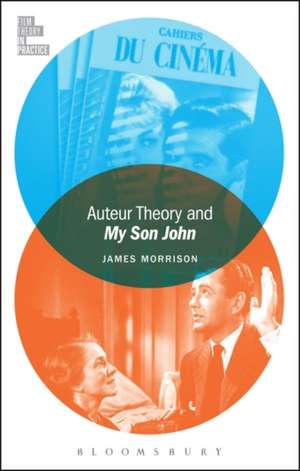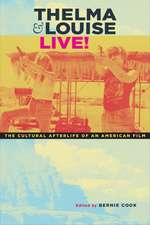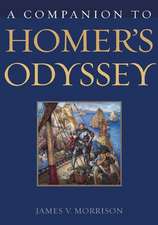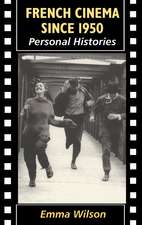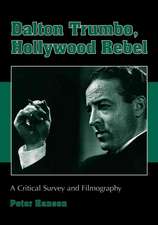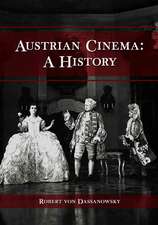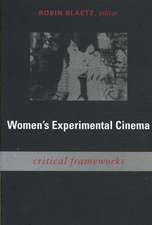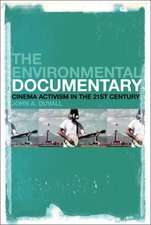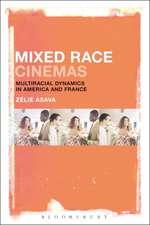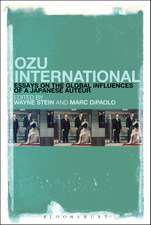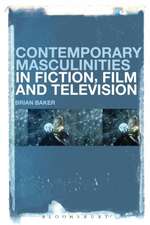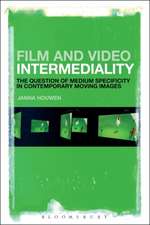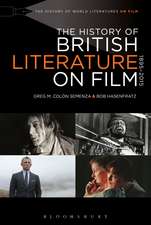Auteur Theory and My Son John: Film Theory in Practice
Autor James Morrisonen Limba Engleză Paperback – 11 iul 2018
| Toate formatele și edițiile | Preț | Express |
|---|---|---|
| Paperback (1) | 131.38 lei 3-5 săpt. | |
| Bloomsbury Publishing – 11 iul 2018 | 131.38 lei 3-5 săpt. | |
| Hardback (1) | 464.45 lei 6-8 săpt. | |
| Bloomsbury Publishing – 11 iul 2018 | 464.45 lei 6-8 săpt. |
Preț: 131.38 lei
Preț vechi: 143.56 lei
-8% Nou
Puncte Express: 197
Preț estimativ în valută:
25.15€ • 27.32$ • 21.14£
25.15€ • 27.32$ • 21.14£
Carte disponibilă
Livrare economică 31 martie-14 aprilie
Preluare comenzi: 021 569.72.76
Specificații
ISBN-13: 9781501311741
ISBN-10: 1501311743
Pagini: 200
Dimensiuni: 127 x 197 x 18 mm
Greutate: 0.2 kg
Editura: Bloomsbury Publishing
Colecția Bloomsbury Academic
Seria Film Theory in Practice
Locul publicării:New York, United States
ISBN-10: 1501311743
Pagini: 200
Dimensiuni: 127 x 197 x 18 mm
Greutate: 0.2 kg
Editura: Bloomsbury Publishing
Colecția Bloomsbury Academic
Seria Film Theory in Practice
Locul publicării:New York, United States
Caracteristici
Groundbreaking approach to auteurism, applied to one of the most explicit propaganda films ever made
Notă biografică
James Morrison is Professor of Literature and Film at Claremont McKenna College, USA. He is the author, co-author or editor of nine books, including Roman Polanski (2007) and Hollywood Reborn (2010).
Cuprins
IntroductionSection 1: Auteur Theory Section 2: Auteur Theory and My Son JohnConclusionBibliography
Recenzii
Brilliant . [a] superb history and analysis of auteurist criticism.
Reading My Son John both as an instance of the Red Scare-era 'film rouge' and a fine-grained text that generates meaning in the smallest gesture of stay Helen Hayes, leaves little doubt as to the proper value-even in this empathetic, troubling, mutilated picture-of McCarey's artistry.
Morrison's book is the most illuminating discussion of French auteurism and its influence I've ever read. It's also a convincing defense of writing about movie directors as authors, capped by a brilliant analysis of Leo McCarey's seldom-discussed My Son John. I couldn't put it down.
No one currently writing on film has a more beautiful, captivating prose style than James Morrison. Sentence by sentence, his commentary on Leo McCarey and the auteur theory is alive-alive with wit, with continually surprising insights (every paragraph contains a jewel), and with the unfailing precision and grace of his close readings. Morrison blows the dust off the fossilized remains of French and American versions of auteurism-and has startling things to say about the affiliations of auteurists and surrealists, the mysteries of the glimpse or "flash" moment, and the valor of defeat in the work of anointed directors. Morrison's study builds to its astonishing centerpiece-a stunning, full-scale analysis of McCarey's much maligned rouge, My Son John. Making ample, sophisticated use of the most intriguing tools in the auteurist kit, Morrison offers an utterly persuasive case for the film as a major work. Too often, facile claims are made for new critical studies as essential reading. Realizing the danger of excess in proclaiming a study's merits, I will nevertheless declare this one of best books of film scholarship I have ever read.
Reading My Son John both as an instance of the Red Scare-era 'film rouge' and a fine-grained text that generates meaning in the smallest gesture of stay Helen Hayes, leaves little doubt as to the proper value-even in this empathetic, troubling, mutilated picture-of McCarey's artistry.
Morrison's book is the most illuminating discussion of French auteurism and its influence I've ever read. It's also a convincing defense of writing about movie directors as authors, capped by a brilliant analysis of Leo McCarey's seldom-discussed My Son John. I couldn't put it down.
No one currently writing on film has a more beautiful, captivating prose style than James Morrison. Sentence by sentence, his commentary on Leo McCarey and the auteur theory is alive-alive with wit, with continually surprising insights (every paragraph contains a jewel), and with the unfailing precision and grace of his close readings. Morrison blows the dust off the fossilized remains of French and American versions of auteurism-and has startling things to say about the affiliations of auteurists and surrealists, the mysteries of the glimpse or "flash" moment, and the valor of defeat in the work of anointed directors. Morrison's study builds to its astonishing centerpiece-a stunning, full-scale analysis of McCarey's much maligned rouge, My Son John. Making ample, sophisticated use of the most intriguing tools in the auteurist kit, Morrison offers an utterly persuasive case for the film as a major work. Too often, facile claims are made for new critical studies as essential reading. Realizing the danger of excess in proclaiming a study's merits, I will nevertheless declare this one of best books of film scholarship I have ever read.
